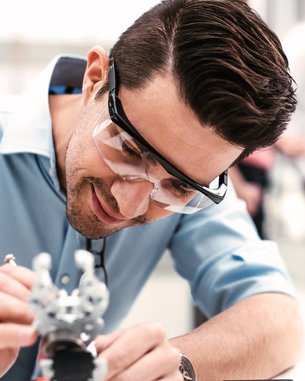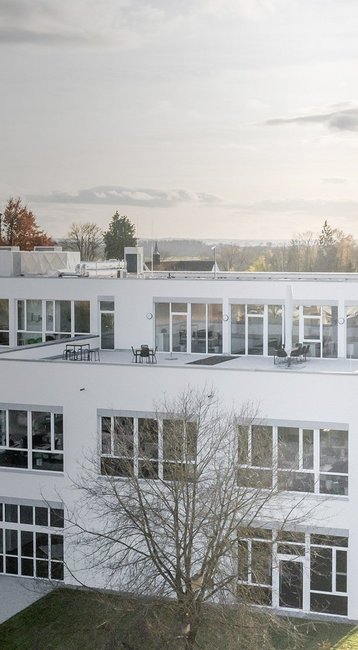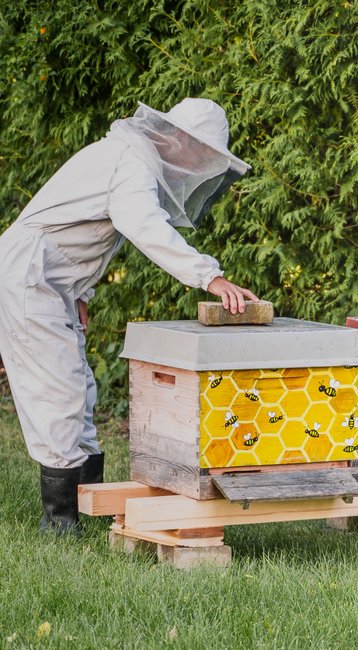
Transformation to a paperless university
As part of our efforts to reduce our paper consumption and create more efficient administrative processes, we have successfully digitised the welcome letter. This initiative saves paper, time, and resources.
We want to advance university development while protecting natural resources.



Our carbon footprint from 2019 was a decisive factor in formulating our goals in the area of ecology. As a distance learning university, our footprint is comparatively small. We also use recycled paper and have been using 100% green electricity at our main site for years. Nevertheless, we have set ourselves ambitious reduction targets for the coming years with regard to our consumption of paper, heat, electricity, water and fuel.
The following initiatives are an important step on our journey towards a more sustainable university administration. We are proud to make a contribution to environmental protection and to continuously improve our processes.

Transformation to a paperless university
As part of our efforts to reduce our paper consumption and create more efficient administrative processes, we have successfully digitised the welcome letter. This initiative saves paper, time, and resources.

Introduction of digital signatures in university administration
Another step towards digitalisation and efficiency is the introduction of digital signatures in university administration. This technology enables us to sign documents quickly and securely without having to rely on paper and printer ink.

New brochure concept with digital and printed versions
To meet the needs of our users while minimizing environmental impact, we have implemented a new brochure concept. Our brochures are now available in both digital and—if desired—printed formats.

Transition to 100% recycled paper (Blue Angel certified)
As part of our commitment to environmental protection and sustainability, we have fully transitioned to using 100% recycled paper certified by the Blue Angel. This initiative helps us reduce our environmental impact and minimize our ecological footprint.

Introduction of the digital student ID
To reduce plastic consumption and simplify our processes, we have introduced a digital student ID. This eco-friendly alternative to the traditional plastic card, conserves resources and allows our students to conveniently carry their ID on their mobile devices.

Printer-free home offices
In our efforts to create a more sustainable work environment for our staff, we have decided to eliminate printers from home offices. This measure reduces paper consumption and promotes a digital work approach, enabling a flexible and efficient work environment.

We are excited to announce a significant step towards sustainable mobility by converting all company vehicles to hybrid drive. This initiative reflects our commitment to eco-friendly solutions and helps reduce our ecological footprint.

To support our employees and promote environmentally friendly commuting options, we have introduced the job ticket in the Rhine-Neckar transport association. This initiative allows our team members to travel to work conveniently and affordably by public transport, contributing to climate protection.

Sustainability is a core value of our organization, which is why we have integrated it into our travel policy. We now more thoroughly assess whether business trips are absolutely necessary or if alternatives such as online meetings can be utilized to reduce CO2 emissions. For business travel, we prefer the use of public transportation to minimize environmental impact and select sustainable hotels to further reduce our ecological footprint.
These measures are an important step towards more sustainable and efficient energy use. We are confident that they will result in cost savings and make a positive contribution to environmental protection.

Employee awareness and sensitization for efficient heating
To promote mindful energy use, we recently conducted an employee awareness campaign focused on heating consumption and energy-saving practices. Through targeted training sessions and informative materials, we have enhanced understanding of the importance of efficient energy use within our organization.

Optimization of heating system
As part of our energy-saving efforts, we have thoroughly reviewed and optimized our heating system. This included fine-tuning the flow temperature and performing a hydraulic balance to reduce heat consumption and improve efficiency.

Adjustment of outdoor lighting controls
We have also revised the controls for our outdoor lighting, adjusting them to match specific times and environmental sensitivity. This measure allows us to save energy by ensuring that lighting is only activated when necessary.

Optimization of server room cooling
To reduce energy consumption in the server room, we have gradually increased the cooling temperature by 3 degrees. This adjustment helps us maintain the operational temperature at an optimal level while avoiding unnecessary energy use.

To improve energy efficiency, we have optimised the stairwell lighting at the Riedlingen site. We have also made the basement lighting autonomous and switched the escape lights to standby to reduce energy consumption.
We are committed to environmental protection and sustainability. Recently, we conducted an employee awareness campaign on waste reduction and recycling. The focus was on efficient waste separation and providing additional yellow bags and containers to ensure optimal separation of different waste types.

As part of our efforts to reduce our ecological footprint, we have transitioned all postal shipments to Greenmail. This guarantees climate-neutral postal dispatch and contributes to environmental protection.

We have further reduced the use of promotional items, especially at events like the Christmas party. Employees can now choose their preferred goodies based on the event. Additionally, we increasingly opt for regional, ecological, and sustainable products, including our own honey.

We have developed a guide for "Green Events" to ensure that all our events meet the highest sustainability standards. This includes using online or hybrid solutions, traveling by public transport, sustainable catering, and efficient waste management.

Since July 14, 2022, SRH Fernhochschule – The Distance Learning University has welcomed 80,000 diligent ambassadors of sustainability. Two beehives contribute ecologically and make the university’s sustainability strategy both visible and tangible.
![[Translate to English:] Dominik Schärmer | SRH Fernhochschule A man with glasses and a beard is wearing a white shirt. He is smiling and standing slightly sideways in front of a neutral background.](/fileadmin/_processed_/f/9/csm_SRH_Fernhochschule_I_Dominik_Schaermer_I_Hohe_Qualitaet_31e5f8c9f1.jpg)
We have already implemented measures to reduce resource consumption. However, we are just at the beginning of an exciting journey. Our aim is to continuously improve and fulfill our responsibility to future generations.
Learn more about the goals and measures of our sustainability strategy. Our overall institutional strategy includes social, ecological and economic aspects.